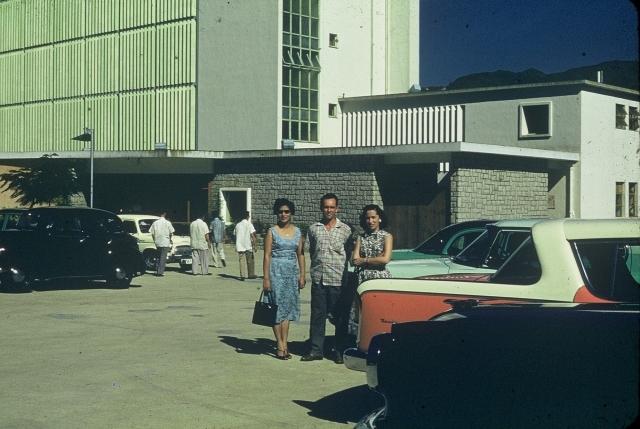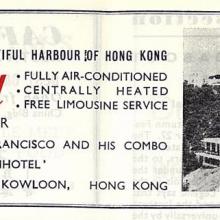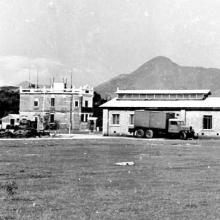This picture is of my mother (on the left) with my sisters god parents. Had no idea where it was taken but when Venessa posted her picture here I could see straight away it was the same place. The power of the internet!!! Thanks David and Venessa!!! Good on ya!!
Shatin Heights Hotel
Primary tabs

Submitted by Admin
Date picture taken (may be approximate):
Sunday, January 1, 1956
Gallery:
Connections:
- Shatin Heights Hotel shows Place Shatin Heights Hotel [1955-1980]




Comments
re: Shatin Heights Hotel
Greg, thanks for posting your photo. Any guesses which year it was taken?
I've added a place (click here to view) so you can see roughly where the photo was taken.
Regards, David
Shatin Heights Hotel
Hi David,
Cannot say exact date or year but it would be about 1956 and no later that 1959.
Never thought I would be able to identify the place!!!
Regards
Greg
Thanks Greg, I've set it to
Thanks Greg, I've set it to 1956.
Sha Tin Heights Hotel 1979
My husband and I with our three daughters aged 8, 6 and 2 lived in Sha Tin Heights Hotel from Feb.-Jly or maybe August 1979. I didn't look much different from the photos in the 50's!. Some snippets I remember - the early morning pig train, damp walls, french toast, waiters shuffling along in their carpet slippers (black fabric with thin brown soles) driving in the Kombi vans to Star Ferry, the rural outlook and the fog.
Shatin Heights Hotel
In 1970, the hotel was a usual stopover for lunch for a Full-day Tour of the New Territories, apart from the Yuca de lac opposite the CUHK. Carlton Place had already lost lustre amidst the urbanisation of Shamshuipo. Those were the days when one took Western tourists to Lok Ma Chau to take photos of the 'Red Guards' across the Border.
At Shatin Heights, one sat at the garden patio restaurant overlooking the beautiful scenery of Shatin Valley and the 'Mong Fu Shek' on the knoll. Is there an English name of the rock featuring 'mother with child strapped to the back, waiting for the return of the husband'?
The Sahtin Valley (Hung Mui Guk) was a favourite place for excursions for primary school children. The restaurants and kiosks around the Shatin Train Station sold fried bean curd snacks.
Lawrence
Re: Shatin Heights Hotel
Lawrence 師兄﹐
I think that would be Amah Rock.
Best Regards,
T
Shatin Heights
Thanks T. The Wife (or Mother) became the Amah in the translation! That's why I could not recall it.
L
Shatin Heights Hotel - Our school bus stop
From 1970 to 1975, the Shatin Heights Hotel carpark also served as the school bus stop for those of us at Beacon Hill School. Every morning we would walk down the road from K.K.Terrace to the hotel and others would be driven down from up at Shatin Heights Road. Fond memories !! john T
Never forgot afternoon tea on the terrace
In my early teens in the mid 1950s my parents often took us to have afternoon tea on the terrace of Shatin Heights Hotel. The sight overlooking the valley and distant hills was most beathtaking and unforgettable, Many years later as a grown up, having breakfast on an outside deck in a hotel in the Tyrol the scenes suddenly all came back!!!!
Ah! the beautiful yester years! All the money now in Hong Kong cannot replace its present garish glitter with such chic old style.
More memories of Shatin Heights Hotel
I do recall while waiting for our school bus (during the 70's), we would wander into the lobby of the hotel and on the wall was a picture of the 'Amah Rock' with its story however, the Amah in the picture was actually Hong Kong actress Nancy Kwan who I also recall being a 'Bus Mum' on a few occasions as we travelled to Beacon Hill School in Kowloon Tong.
As for the hotel, I sadly recall getting a picture on site as it was being demolished. Not sure the year but believe it was around the late 70s or early 80s. John T
Nancy Kwan
I suspect the reason for Nancy in the picture was because she starred in a short film in the mid-60's called Mong Fu Sek (aka The Magic Stone) - basically a dramatical retelling of the legend with Nancy in the starring role. It was directed by Brian Salt and some anecdotes about it can be found in Pete Moss's book No Babylon: A HK Scrapbook.
Nancy Kwan
Thanks philk!
You’ve cleared that up for me after over 45 years!
Wouldn’t mind having a look at Pete Moss’s book.
cheers,
john T
By 1960 I was no longer in HK
By 1960 I was no longer in HK and therefore did not see Nancy Kwan's short film. However the translation of " Amah Rock " missed the true meaning of the Chinese name. The original name actually means " longing for the husband to return ". As a child I actually had my own " Amah" , a nanny assigned to look after me only. Amahs were usually spinsters from counties near Canton. To a child the Amah was often closer than his mother!
My family had some land and a house in the hills beyond Taipo Market. The station is now a museum. When the steam train came out of the tunnel we would lower the window and see the Amah Rock. Considering many men used to go overseas as indentured labour I now appreciate it was a poignant story.
Amah Rock / 望 夫 石
Greetings, and I agree with you Munchausen - https://gwulo.com/atom/16079
The three-character Chinese name best matches its appearance, and her design if erected by humans. I have not been able to find out how this rock formation came into existence.
On the steep slope just below her facing Shatin, I noticed during my several hikes many small broken rocks. And there were, still are seen from Google photos, large boulders along the path leading from the south to the site. Other civilizations have moved and lifted much bigger rocks, and chipped them down to desired size and shape. Could this be one of the world's wonders in the smaller size category? As ex-HKer, I hold dear the times I stood and sat by her. I think all ex-HKers who have visited the site will agree. Regards, Peter
May I know where is this
Shatin Heights Hotel
As the title suggests, the name was the Shatin Heights Hotel and yes, it was on the site now occupied by the Shatin heights development (沙田花園). The Imperial Hotel is located in TST, see here. Perhaps the foundation stone was moved during a renovation? Do you have a picture you can upload?
...
1960
The completion date was 1960, so it's quite possible that the construction/foundation stone laying was done in 1959.
...
Imperial Hotel
Apologies for the confusion. My comments regarding the foundation stone were in reference to the Imperial Hotel. If you click on the link I gave above you can see the Imperial Hotel opened in 1960.
The only thing I can think of as to why the stone for a TST hotel is there is because someone nearby was involved in a renovation there perhaps and it is a keepsake that has been subsequently dumped.
Foundation Stone near Ascot Villas
By coincidence, a Friend of Heritage posted a photo of the said foundation stone in our AMO Heritage docent WhatsApp group & asked whether it was Imperial Hotel. Another FoH posted a better picture as I commented there were too many dirty marks hiding the words. Then I commented it was a misinterpretation. I transcribed the wordings as follows : "This Foundation Stone was jointly laid by Peter Cheung, MBE Chairman of the Board Mann Yip Development Ltd. (and) Candido P. Sorienle President and Chairman of the Board Imperial Hotel Ltd. on 30th April 1959" It shouldn't belong to the Shatin Heights Hotel which was completed in 1955 and located at a distance. Also seems illogical for the Imperial Hotel as it was located at Tsimshatsui. Since Ascot Villas was completed in 1974 while the stone laid in 1959 has the word "This", it would most probably be referring to its preceding property. If it was the foundation stone for Imperial Hotel but removed to here upon its renovation, we need to check who were the developers first before jumping to conclusion.
Ascot Villa
you need to upload them first
regarding how to upload - https://gwulo.com/node/6046
then to add to your post/comment, click on the flip out menu on far right of the screen and choose your image from the selection.
It was Really the Foundation Stone of Imperial Hotel
Research on lost history is not easy as evidence may also vanish over time. The Foundation Stone discovered near Ascot Villas at Shatin Heights is one typical example. Believe it or not, it was really the foundation stone of the old Imperial Hotel at Tsimshatsui. Although just an indirect proof, I 'll disclose my initial findings later. Why was it removed from Tsimshatsui to Shatin Heights? That remains to be researched.
Peter Moss
Unfortunately Peter has passed away in 2019. He was my division head when I was working in the Government Information Services in the 1980s. Will try to see whether I could find his book in the public library or the Special Collection of HKU Main Library. The English name Amah Rock reflected the cultural gap between the expatriates and the locals. Legendary stories are sometimes confusing too even in Chinese. To clarify the facts and truth, one has to grasp the essence of Classical Chinese. It would be nice if Nancy could recall the story behind the film.
Pete Moss
Hi Alan
yes, it was very sad to hear of Pete's passing last year. It's also a shame that his vast collection of photos appears to now be lost from public view as his online website appears to have lapsed since his passing. He had some really nice photos from his time in the 60's in Sai Kung and his trips out to places such as Plover Cove when it was being turned into the reservoir.
The book I mentioned above is definitely in the library because that is where I read it, but I have also seen copies still around in various book shops over the last few years. Perhaps it was reprinted recently?
Regards
Phil
P.S I can't imagine a foundation stone being removed from a building unless it underwent a significant renovation which called for its removal. I am intrigued by what you have found so please share when you get the opportunity.